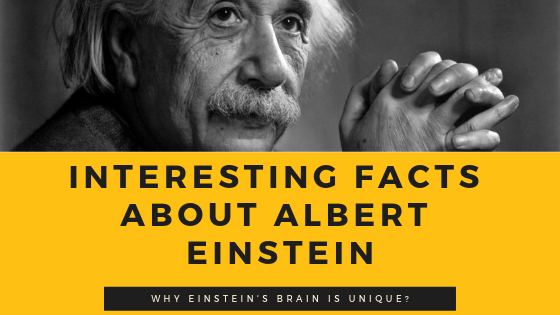Latest interesting facts about Albert Einstein| Why Einstein’s Brain is unique?
By Aditya pandey | Article | Jul 17, 2019

Who is Albert Einstein?
Albert Einstein was a physicist who is known for developing the relativity theory. He was born on
March 14, 1879 in the Germany and is considered one of the most influential physicists of this era.
Important Albert Einstein Facts:
It was in the year 1921, he won the Nobel Prize for his work on material science for his clarification
of the photoelectric impact. In the next decade, he moved to the U.S. in the wake of being focused
by the Nazis. His work additionally majorly affected the advancement of nuclear vitality. In his later
years, Einstein concentrated on bound together field hypothesis. With his energy for request,
Einstein is commonly viewed as the most powerful physicist of the twentieth century.
Albert Einstein: Inventions and Discoveries:
As a physicist, Einstein had numerous revelations, yet he is maybe best known for his hypothesis of
relativity and the condition E=MC2, which foreshadowed the improvement of nuclear power and
the nuclear bomb.
Hypothesis of Relativity:
Einstein previously proposed an uncommon hypothesis of relativity in 1905 in his paper, "On the
Electrodynamics of Moving Bodies," taking material science an energizing new way. By November
1915, Einstein finished the general hypothesis of relativity. Einstein considered this hypothesis an
amazing climax explore.
Einstein's E=MC2
Family:
Albert Einstein experienced childhood in a mainstream Jewish family. His dad, Hermann Einstein,
was a sales rep and architect who, with his sibling, established Elektrotechnische Fabrik J. Einstein
and Cie, a Munich-based organization that produced electrical hardware. Albert's mom, the previous
Pauline Koch, ran the family. Einstein had one sister, Maja, brought into the world two years after
him.
Albert Einstein: Wives and Children
Albert Einstein wedded Milena Maric on Jan. 6, 1903. While going to class in Zurich, Einstein met
Maric, a Serbian material science understudy. Einstein kept on developing nearer to Maric, yet his
folks were unequivocally against the relationship because of her ethnic foundation. Regardless,
Einstein kept on observing her, with the two building up a correspondence by means of letters in
which he communicated a significant number of his logical thoughts. Einstein's dad passed away in
1902, and the couple wedded from that point.
Einstein's Brain:
Amid Albert Einstein's post-mortem examination, Thomas Stoltz Harvey expelled his cerebrum,
allegedly without the authorization of his family, for conservation and future investigation by
specialists of neuroscience. Notwithstanding, amid his life Einstein partook in mind examines, and
something like one life story says he trusted specialists would consider his cerebrum after he kicked
the bucket. Einstein's mind is presently situated at the Princeton University Medical Center, and his
remaining parts were incinerated and his fiery remains dissipated in an undisclosed area, following
his desires.
In 1999, Canadian researchers who were contemplating Einstein's mind discovered that his second
rate parietal projection, the territory that forms spatial connections, 3D-representation and
numerical idea, was 15 percent more extensive than in individuals with ordinary insight. As per The
New York Times, the analysts trust it might help clarify why Einstein was so smart.
Nobel Prize for Physics :
In 1921, Einstein won the Nobel Prize for Physics for his clarification of the photoelectric impact,
since his thoughts on relativity were as yet viewed as sketchy. He wasn't really given the honor until
the next year because of a bureaucratic decision, and amid his acknowledgment discourse regardless
he selected to talk about relativity.
In the advancement of his general hypothesis, Einstein had clutched the conviction that the universe
was a settled, static substance, otherwise known as a "cosmological steady," however his later
speculations specifically repudiated this thought and affirmed that the universe could be in a
condition of transition. Space expert Edwin Hubble found that we without a doubt occupy a growing
universe, with the two researchers meeting at the Mount Wilson Observatory close Los Angeles in
1930.
सरकारी नौकरियों, जीके अपडेट्स और करेंट अफेयर्स की ताज़ा जानकारी सबसे पहले पाने के लिए:
-
हमारे WhatsApp चैनल को फॉलो करें:
https://whatsapp.com/channel/0029Vb6sjZz0wajwDXcd5B0U -
हमारे Telegram चैनल को फॉलो करें:
https://t.me/educationmastersin -
हमारे Facebook Page को फॉलो करें:
https://www.facebook.com/educationmastersindia
Share this Post
(इस पोस्ट को अपने दोस्तों के साथ शेयर करना ना भूले)Posts in Other Categories
Latest Posts
Top 10 Longest Rivers in the World | Length, Ori ...
Feb 05, 2026
JEE Main 2026 Session 1 Answer Key Out @ jeemain ...
Feb 04, 2026








.jpg)
.jpg)

